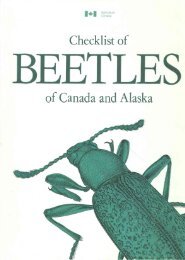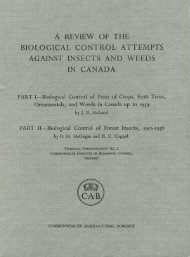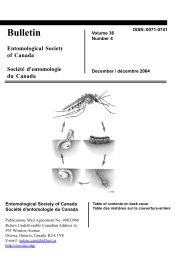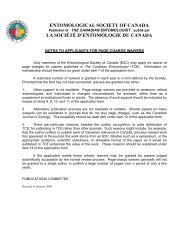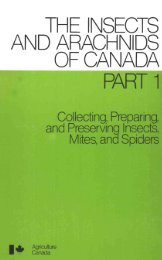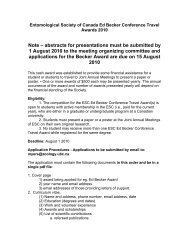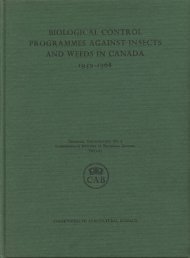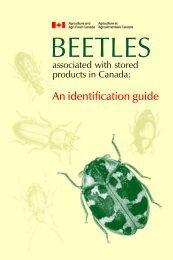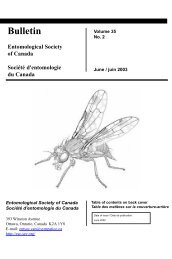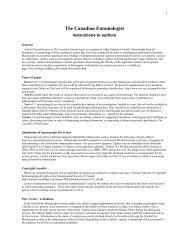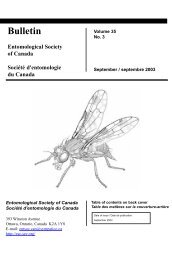pdf, 57.71Mb - Entomological Society of Canada
pdf, 57.71Mb - Entomological Society of Canada
pdf, 57.71Mb - Entomological Society of Canada
Create successful ePaper yourself
Turn your PDF publications into a flip-book with our unique Google optimized e-Paper software.
54 W. J. Turnock<br />
Recommendations<br />
Acknowledgements<br />
Statement 1978, Kostylyova 1979). In the regions where the host is univoltine, T. evanescens<br />
generally is very rare (Prokoreva 1976). It is used as an inundative biological<br />
control agent in the USSR.<br />
The major components <strong>of</strong> the parasitoid guilds <strong>of</strong> M. configurata and M. brassicae<br />
attacking the early instar larvae include one ichneumon, B. f1avescens, in <strong>Canada</strong>; and<br />
two ichneumons, E. cintipes and Microplitis mediator, and one tachinid, E. consobrina,<br />
in western Europe. In <strong>Canada</strong>. one tachinid, A. cinerea, attacks the late instar larvae <strong>of</strong><br />
Mamestra cotlfigurata but no species <strong>of</strong> comparable effectiveness is reported from Eurasia.<br />
No egg parasitoids occur in <strong>Canada</strong> whereas T. evanescens occurs at generally low levels<br />
in Eurasia.<br />
The differences in the major components <strong>of</strong> the parasitoid guilds <strong>of</strong> M. configurata and<br />
<strong>of</strong> M. brassicae lead to the following recommendations for parasitoid introductions into<br />
<strong>Canada</strong>:<br />
(1) Parasitoids attacking the early larval ins tars<br />
(a) Ichneumons: B. f1avescetls in <strong>Canada</strong> is more effective than either E. cinctipes<br />
or Microplitis mediator in Eurasia. M. mediator does not go into diapause and does not<br />
occur in those parts <strong>of</strong> the Soviet Union where Mamestra brassicae is univoltine. Neither<br />
E. cinctipes nor Microplitis mediator should be considered for introduction into <strong>Canada</strong>.<br />
(b) Tachinids: Mamestra configurata does not have an effective species attacking the<br />
early larval instars as Mericia ampe/us is poorly adapted. E. consobrina is an important<br />
parasitoid in Eurasia. It successfully parasitizes Mamestra configurata in the laboratory<br />
(Wylie 1977a) and has potential as a biological control agent. Material for releases in<br />
<strong>Canada</strong> should be obtained from areas where M. brassicae is univoltine.<br />
(2) Parasitoids attacking late larval instars<br />
In <strong>Canada</strong>, A. ci1lerea is common, particularly during outbreaks, but no equivalent<br />
species is reported as a major parasitoid <strong>of</strong> M. brassicae in Eurasia. A. cinerea could<br />
be considered for introduction into the Soviet Union, perhaps as part <strong>of</strong> an exchange <strong>of</strong><br />
material involving E. C01lsobri1la. M. brassicae was a suitable host for A. cinerea in<br />
laboratory tests (Wylie 1977a).<br />
(3) Egg parasitoids<br />
The very low level <strong>of</strong> egg parasitism in M. brassicae does not suggest that T. evanescens<br />
would contribute significantly to the control <strong>of</strong> M. configurata in <strong>Canada</strong>. However, the<br />
local form <strong>of</strong> T. evanescens reported from the Irkutsk region (Kostylyova 1979) should<br />
be further investigated. If <strong>Canada</strong> should develop facilities for producing Trichogramma<br />
for inundative release, importation <strong>of</strong> the "Irkutsk" form would be desirable.<br />
Copies <strong>of</strong> the cited literature from the USSR were made available through the efforts<br />
<strong>of</strong> Mr A.1. Sylchenko, Ministry <strong>of</strong> Agriculture, Moscow, and Dr G. Tsubulskaja,<br />
Ukrainian Plant Protection Research Institute, Kiev. Their cooperation is greatly<br />
appreciated. Dr A.P. Arthur, Agriculture <strong>Canada</strong>, Saskatoon, kindly permitted the use<br />
<strong>of</strong> his data on parasitism <strong>of</strong> M. configurata in Saskatchewan.



